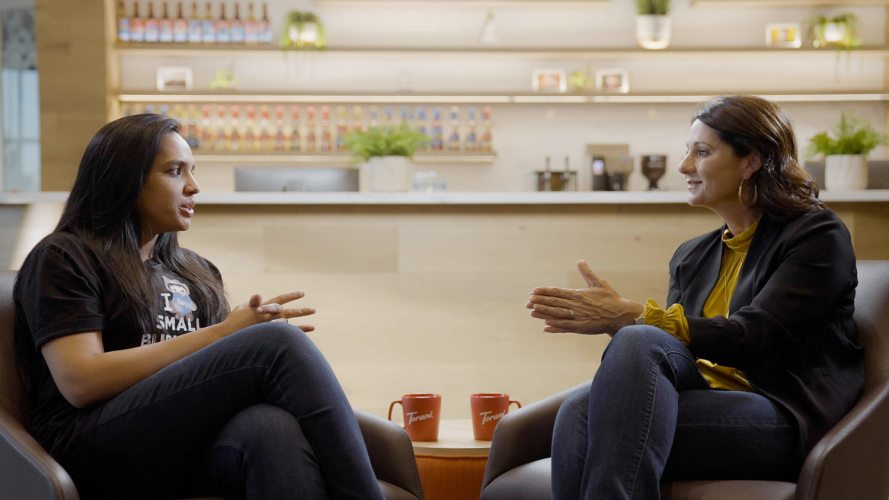High-Growth Companies Canva, Headspace, and Torani Share Secrets to Success Now



A few businesses have beat expectations during the pandemic. Here’s how three of these businesses grew during uncertainty.
As we get closer to 2022, small and medium businesses (SMBs) are doubling down on one question: “How can I achieve success during a time of many changes?”
At the SMB Main Show at Dreamforce this year, I had the pleasure of hearing how leaders at high-growth companies Canva, Headspace, and Torani transformed their operations and strategies to find success in an all-digital world.
See these business leaders share their high-growth tactics at Dreamforce and get actionable takeaways today!
Watch the main show featuring these companies that out-paced competitors and grab content that applies to your business needs.



Here’s a recap of top insights from Stacy Cooper Dent, general manager of international business at Torani, Lindsay Crittendon, senior director of strategy and operations at Headspace, and John Eitel, global vice president of sales and success at Canva.
Insights from my chat with Torani, a 96-year-old San Francisco-based family-owned company that produces flavoring syrups, sauces, and blended drink bases
How has the pandemic shaped your business and how are you rethinking customer experience as a result?
Stacy Cooper Dent: When that first stay at home order hit back in March of 2020, we didn’t know much, but we knew that we were going to put people at the center of every decision — our team, our customers, and of course, our consumers. When we reopened as an essential manufacturing company with a skeleton crew, we figured out first how to keep our team safe. Then we made a commitment to not lay a single person off. In our hundred-year history, we had never laid anyone off. We cut millions of dollars of funding, but it was never around people.
And then we were surprised. Our consumers, who would always enjoy Torani drinks at their favorite cafes, brought Torani into their houses from grocery stores and retailers to start making their favorite drinks … And we even created the Torani Cafe Opportunity Fund to help the cafes that were struggling; to help them and their baristas. When we hit the end of the year, we had again grown by double digits and everyone was safe and healthy.
What are your key takeaways from the last year and a half?
Stacy Cooper Dent: When we think back to COVID and how it shaped our business, I think what it did was really affirming for us that the way we think business can work, can actually work. When you put people at the center of your decisions, both our team and our customers didn’t just survive the pandemic, they really thrived.
Insights from my chat with Headspace, a mindfulness company specializing in meditation
Headspace rapidly grew its customer base over the past 18 months, what has helped you achieve growth while keeping your customers front and center?
Lindsay Crittendon: Headspace grew significantly through 2020 and 2021 and that is primarily driven by our commitment to our partners and making the world of our human resources (HR) partners as easy and seamless as possible. This is all facilitated by technology, Salesforce included, that helps us deeply understand their needs, track those, and operationalize around them.
How are you staying connected with your customers and prospects?
Lindsay Crittendon: At Headspace, to really move into a digital world and help our partners be successful, we developed a mindful leadership program. This program helps managers understand how to bring empathy into the workplace, especially during a time when we all need as much empathy and compassion as we can muster.
Insights from my chat with Canva, a graphic design platform that democratizes design
As Canva’s go-to-market strategy has grown and evolved over time, how have you adapted to those changes as a leader?
John Eitel: Over the last year and a half, we have been scaling and growing our teams dramatically. That of course has a lot of challenges, which we’ve seen along the way. But we really want to keep the focus on the customer and not see any kind of drop-off in the way that we handle and manage those relationships. That has caused us to make sure we’ve built the right systems, processes, and teams to make sure we support those customers while doing those in a digital format and a distributed manner.
What is the key to Canva’s success in expanding up-market?
John Eitel: We’ve built a very client-focused model, with teams tailored to deliver white-glove service to their enterprise and large team accounts that we’re bringing on the platform … we also utilize great tools, like Slack and Salesforce, that really help us keep that visibility into where we stand with our customers, allow us to communicate synchronously and asynchronously, and be there at a moment’s notice.
What advice do you have for other SMBs out there looking to scale and grow right now?
John Eitel: Own your niche — know what you’re good at, and what you want to be known for and be the best at it. And never lose focus on the customer. As cliché as that sounds, that’s one thing that Canva started the company with — it was with that mindset of what are our customers’ pains and how do we solve it. And we’ve continued to evolve that over time. We didn’t build this enterprise offering in hopes that if we build it they will come. We let our customers guide us on that journey. And this is how we really think about decisions we’re making as a company, how we evaluate where we make investments, and where we prioritize time. It really comes down to what the customers are asking for and how we can make them more successful.
Looking for more tips, tricks, and inspiration from Dreamforce to accelerate business growth?
Catch the full main show featuring these high-growth companies and get our top curated content for your business.



What did you think of the main show? Mention @RekhaSrivatsan on Twitter to let her know your thoughts. Then, learn more about our small business CRM solutions by following us on Twitter, LinkedIn, and Instagram.

























